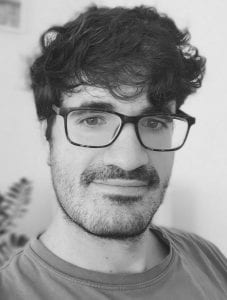My Research Team
 Valerio Biscione | Research Associate
Valerio Biscione | Research AssociateOffice 3D3 | valerio.biscione [at] bristol.ac.uk
Research Interest | I am generally interested in better understanding the human brain through the comparison with simulated brains. Currently my research focuses on the link between some emergent properties of neural networks and their connection with human perception. In particular, I question whether a deep artificial network can be used as a model of the human perceptual visual system. Even if the answer is negative, by posing the question I hope to get a better idea about what components we are still missing, and what we need to get there. During my PhD I have focused on decision making strategies under time pressure in humans, and I am also deeply passionate about evolutionary methods applied to social sciences. During my undergraduates I worked in simulating several social and anthropological phenomena in a multi-agent context with genetically evolved neural networks.
 Jeff Bowers | Chair in Experimental Psychology
Jeff Bowers | Chair in Experimental PsychologyOffice 3D22 | j.bowers [at] bristol.ac.uk | Personal Website
Research Interest | My research addresses a range of issues in language and memory. In one line of work I have attempted to gain insight into how word knowledge is coded in the brain. On one general view, word knowledge (and indeed all forms of knowledge) is coded in a distributed (and non-symbolic) manner, such that a word is coded as a pattern of activation across a set of units (neurons), with no one unit devoted to a single letter or word (typically associated with the PDP approach). On another view, word knowledge is coded in a localist (and symbolic) manner, with each letter and word uniquely coded by an individual unit. I’ve carried out a series of behavioral experiments that provide evidence that letters and words are coded in a localist and symbolic manner (e.g., Davis & Bowers, 2005, 2006), as well as some computer simulations that support this conclusion (Bowers, Damian, & Davis, in press, Psychological Review, Bowers & Davis, 2009). I’ve also argued that localist models are more biological plausible than the distributed representations learned in PDP networks (Bowers, 2009).
Key Collaborators

Rui Ponte Costa
Principal investigator and lecturer (Assistant Professor) |University of Bristol
Computational Neuroscience Unit | Bristol Neuroscience and Intelligent Systems | Visual Information Units
I did postdoctoral research in computational/theoretical neuroscience and machine learning at the University of Bern (Switzerland) and at University of Oxford (UK). Previously, I did my PhD at the Institute for Adaptive and Neural Computation, University of Edinburgh as part of the DTC in Computational Neuroscience with Mark van Rossum and P. Jesper Sjöström (funded by a FCT PhD grant). I was also a visiting PhD student at University College London and McGill University.
 John Hummel
John Hummel
Department of Psychology | University of Illinois, USA
I am interested primarily in the representation and processing of relations. Along with language, the ability to perceive, represent and reason about relations is the major factor distinguishing human thinking from the cognitive abilities of all other animals: It is what makes us the dominant species on the planet.
 Ivan Vankov
Ivan Vankov
Department of Cognitive Science and Psychology
New Bulgarian University, Bulgaria
My major research interest is how knowledge is represented in biological and artificial neural networks. In particular, I am investigating the extent to each state-of-the-art neural network models can account for symbolic processing and how their capacity to generalise can be improved by explicitly training them to represent symbols. I am also trying to explain the nature of mental representations which underlie cognitive functions such as short term memory and relational reasoning by using connectionist modelling and behavioural experiments.
Advisory Team
Matthew Botvinick
Director of Neuroscience Research, Google DeepMind
Honorary Professor, Gatsby Computational Neuroscience Unit, UCL
Robert French
National Scientific Research Centre (CNRS) | Université Bourgogne
Gary Marcus
Psychology and neural Science | New York University, USA
Kim Plunkett
Director of the Oxford BabyLab | Fellow of St. Hugh’s College, Oxford | Associate Head for Finance & Physical Capital
Alumni
 Ryan Blything | Research Associate(2017-2020)
Ryan Blything | Research Associate(2017-2020)
Current Position: Teaching Associate, School of Psychology, Aston University.
Research Interest | My research focuses on the ability to generalize existing knowledge to new situations. For example, if we learn a new word, we must be able to generalize its use to a range of morphologically-inflected forms, even if we have never heard the new word used in that way before (e.g., we can spontaneously add -ed to a new verb to signal its past-tense form; text→texted). As part of the ERC project, I investigate generalization in a range of domains, including visual word recognition, spoken word recognition, and visual object recognition. The project investigates what representations underlie the human brain’s ability to generalize and the extent to which these representations support generalization. I will relate these findings to predictions made by symbolic and non-symbolic neural networks with a view to examining whether symbolic representations are required for human-like generalization.
Current Position: Senior Research Associate, School of Education, University of Bristol.
Research Interest | My research focuses on how knowledge is represented in computational models and in the brain. My current work investigates the extent to which artificial neural networks (NNs) learn selective representations. In general, knowledge is represented in a distributed manner across a population of units (or neurons), with each unit involved in representing many classes, items or events, etc. However, this will vary, with some units only involved in representing knowledge about a few classes, or even just a single class. These ‘selective’ units are the focus of my PhD. I have carried out a series of simulations with multi-layer perceptrons, convolutional NNs and recurrent NNs looking at typical levels of selectivity; factors which may lead to increased selectivity; and developing improved selectivity measures which are less prone to over-estimate selectivity.
 Jeff Mitchell | Senior Research Associate (2019-2021)
Jeff Mitchell | Senior Research Associate (2019-2021)Current Position: Lecturer in the Department of Computer Science, University of Sussex.
Research Interest | I’m interested in understanding the capacity of machine learning algorithms to generalise beyond the data they were trained on, and exploiting our knowledge of human cognition to improve these abilities. My research has focused on natural language processing, covering a range of topics from induction of semantic and syntactic representations to prediction of eye-movements during reading and entailment judgements. One theme running through this work has been the relationship between symbolic and distributional representations and how to make the most effective use of these approaches computationally. However, purely algorithmic considerations are probably insufficient on their own to understand how to achieve robust human-like behaviour, and I’m hoping to learn more about the psychology of generalisation during the project.

Current Position: Lecturer in Computer Science and AI (Informatics), University of Sussex.
Research Interest | My research seeks to understand the emergent properties of neural systems through computational modelling techniques spanning multiple levels, from ion channels to networks. I am particularly interested in the brain’s ability to self-organise through synaptic plasticity, adapting to the statistical regularities of its environment to support flexible and intelligent behaviour. Previously I have modelled optogenetics, authoring PyRhO, a suite of computational tools for modelling and simulating opsins. I have also collaborated on several projects applying machine learning to a range of biomedical problems including combating Antimicrobial resistance, improve management of Type 1 Diabetes mellitus and non-invasively diagnosing cancer from breath sample analysis. I am also a strong proponent of increasing openness and reproducibility in science.
 Federico Adolfi | Research Student
Federico Adolfi | Research Student
Current Position: Postdoctoral Researcher
Research Interest | My research takes a computational cognitive science approach to problems at the intersection of computer science, psychology, neuroscience, and philosophy. I focus on human and machine audition in particular, and on computational complexity in relation to cognitive capacities more generally. In practice, I work on developing and evaluating computational cognitive models as explanations for natural and artificial cognition, and use tools from theoretical computer science to expose their computational properties. I’m also interested in how we come up with such explanations, what makes them plausible and what makes them useful; that is, meta-theory and philosophy of science.
 Guillermo Puebla| Research Associate (2020 – 2023)
Guillermo Puebla| Research Associate (2020 – 2023)Current Position: Postdoctoral Researcher, National Centre for Artificial Intelligence, Macul, Chile.
Research Interest | I study how people and artificial neural networks learn to represent relations between objects in the world. I’m particularly interested in which classes of models can learn relational representations and what kinds of prerequisites (i.e., inductive biases or innate processing modules) allows people to achieve this feat. Another related interest is how to use relational representations for sequential decision making.
 Marin Dujmović | Research Student (2018 – 2023)
Marin Dujmović | Research Student (2018 – 2023)
Current Position: Research Associate, School of Physiology, Pharmacology & Neuroscience, University of Bristol.
Research Interest | I completed my undergraduate and master’s degrees at the University of Zadar. Whilst there I served as a lab assistant with a wide range of research interests. My main focus has been the research of human reasoning and metacognitive processes. More specifically I am interested in the mechanisms which govern whether purely heuristic or more analytic reasoning processes are employed on a number of different problems such as the base rate neglect task, the Linda problem, the Wason selection task and others. During my time at the project I am interested in investigating relational reasoning, for example in the Set card game. I would also like to test the hypothesis that different heuristics may be based on different types of learning and different types of networks. The implications of this hypothesis can be investigated both through simulations and behavioural research.
 Milton Llera Montero | Research Student
Milton Llera Montero | Research StudentResearch Interest | My research is at the intersection of Psychology and Computational Neuroscience and focuses on biologically plausible models of cognition. Specifically, I am interested in how neural networks that take into account biological and psychological constraints could be implemented and used to learn and process information. One of the issues I am interested in is symbolic processing, which is believed to be indispensable for generalisation and thus cognition. This involves answering questions such as, what are symbols and how are they implemented and manipulated. Another, related issue, is the role of timing and synchronization in neuronal firing and its implications for computation in the brain. One possible question would be how can this be used to implement relational reasoning in tasks such as for example object recognition.

Research Interest | My research focuses on understanding the principles underlying cognition. To understand these principles, I develop both normative and mechanistic models of cognition and compare predictions of these models with human behaviour. I have applied this method to investigate how people produce language, how they perceive time, how they make perceptual decisions and how they represent knowledge. As part of the ERC project, I am investigating the similarities and differences between humans and artificial neural networks on their ability to generalise on visual and numerical tasks.

Current Position: Postdoctoral Researcher in the Psychology Department at Warwick University.
Research Interest | I’m interested in evaluating how suited contemporary deep neural networks are to modelling cognition, and how to make them more aligned with behavioural data. My work has been focused on comparing knowledge representation in neural networks and humans. For my MSc, I examined the representation of faces in DNNs and humans according to what information they use for face recognition and their ratings of similarity between individual faces. Since, I’ve been interested in how structured knowledge – such as relational knowledge or hierarchically organised concepts – can be represented in neural networks. This has lead me to questions like how can symbols, or behaviours such as systematicity, emerge in connectionist models.

I am responsible for organising all of the administrative activities, including organising seminars and events, travel, conferences, coordinating the recruitment of PhD students and Research Associates, developing and maintaining this website and monitoring the ERC budget.
